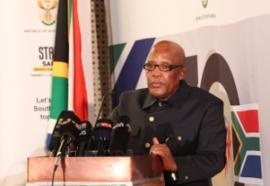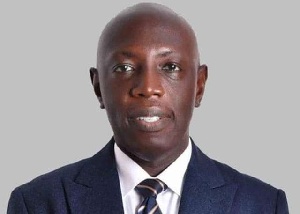Africa News of Thursday, 15 May 2025
Source: www.ghanawebbers.com
South Africa: Motsoaledi - SA's HIV Programme 'Not Collapsing' Following U.S. Aid Cuts

Health Minister Dr. Aaron Motsoaledi has denied claims that South Africa's HIV/AIDS program is collapsing. This follows the withdrawal of funding from the President's Emergency Plan for AIDS Relief (PEPFAR).
Motsoaledi emphasized that the government is taking strong steps to maintain HIV treatment and prevention programs. PEPFAR was established in 2003 by former President George W. Bush and continued under various administrations.
The Minister noted a loss of R7.9 billion from PEPFAR, which is part of the R46.8 billion spent annually on HIV/AIDS programs. Currently, 5.9 million people are on antiretrovirals (ARVs).
He stated, "It is inconceivable that a R7.9 billion cut will collapse the entire program." Reuters reported that testing and monitoring of HIV patients have declined since the U.S. cut aid, affecting pregnant women, infants, and youth.
In response to these cuts, the government launched a strategy to fill the funding gap and continue healthcare services. They have set up weekly provincial meetings to track HIV treatment progress.
The government has reached half a million people through efforts with civil society and secured R1 billion from the Global Fund as alternative funding sources.
Motsoaledi mentioned conducting provincial road shows to engage local healthcare workers and community stakeholders. He argued against claims that South Africa's HIV/AIDS campaign is collapsing.
He said, "If viral load testing has dropped, it does not mean collapse." The Minister acknowledged some problems but insisted they are being addressed daily.
He also discussed the closure of 12 specialized clinics funded by PEPFAR, which resulted in transferring 63,000 patient files to public health facilities.
Despite this challenge, over 1,000 clinicians and more than 2,300 non-clinicians have been trained across seven provinces. The country maintains a stable supply of antiretroviral medications—90% procured through government resources and 10% from donors.
Motsoaledi expressed hope that all South Africans want to end HIV/AIDS as a public health threat by 2030. He urged unity instead of spreading disinformation about the campaign's status after President Trump's decision.
The State is actively seeking support from international partners like the Bill and Melinda Gates Foundation and the French Development Agency.
"This is a time to come together," he said, emphasizing government's commitment to combating HIV/AIDS with significant achievements over the past decade.
Life expectancy has increased from 54.7 years in 2010 to 66.5 years in 2024. Maternal mortality has decreased from 249 to 86 per 100,000 live births since then.
Additionally, the number of HIV-positive babies dropped significantly—from 70,000 in 2004 to just 643 projected for 2025.










